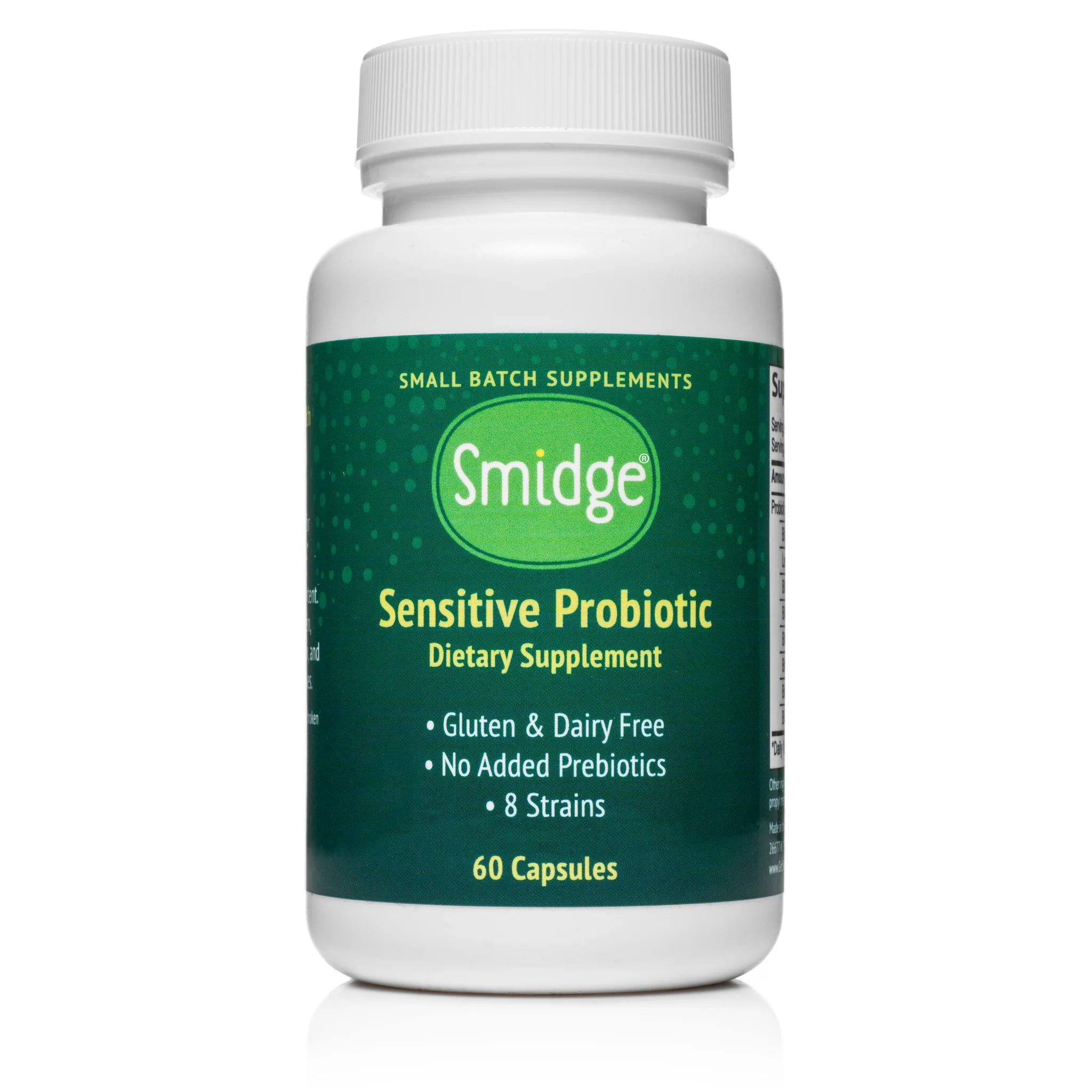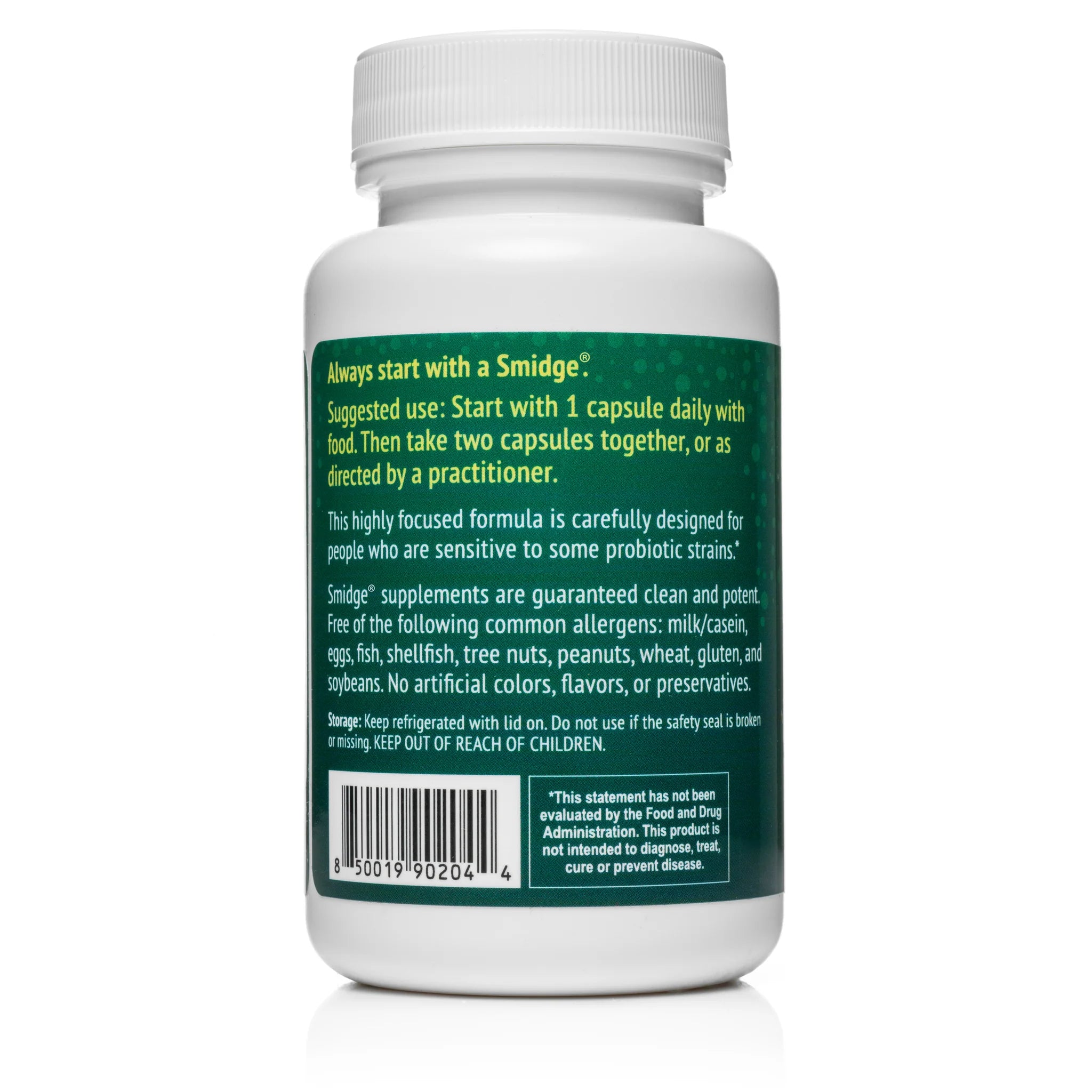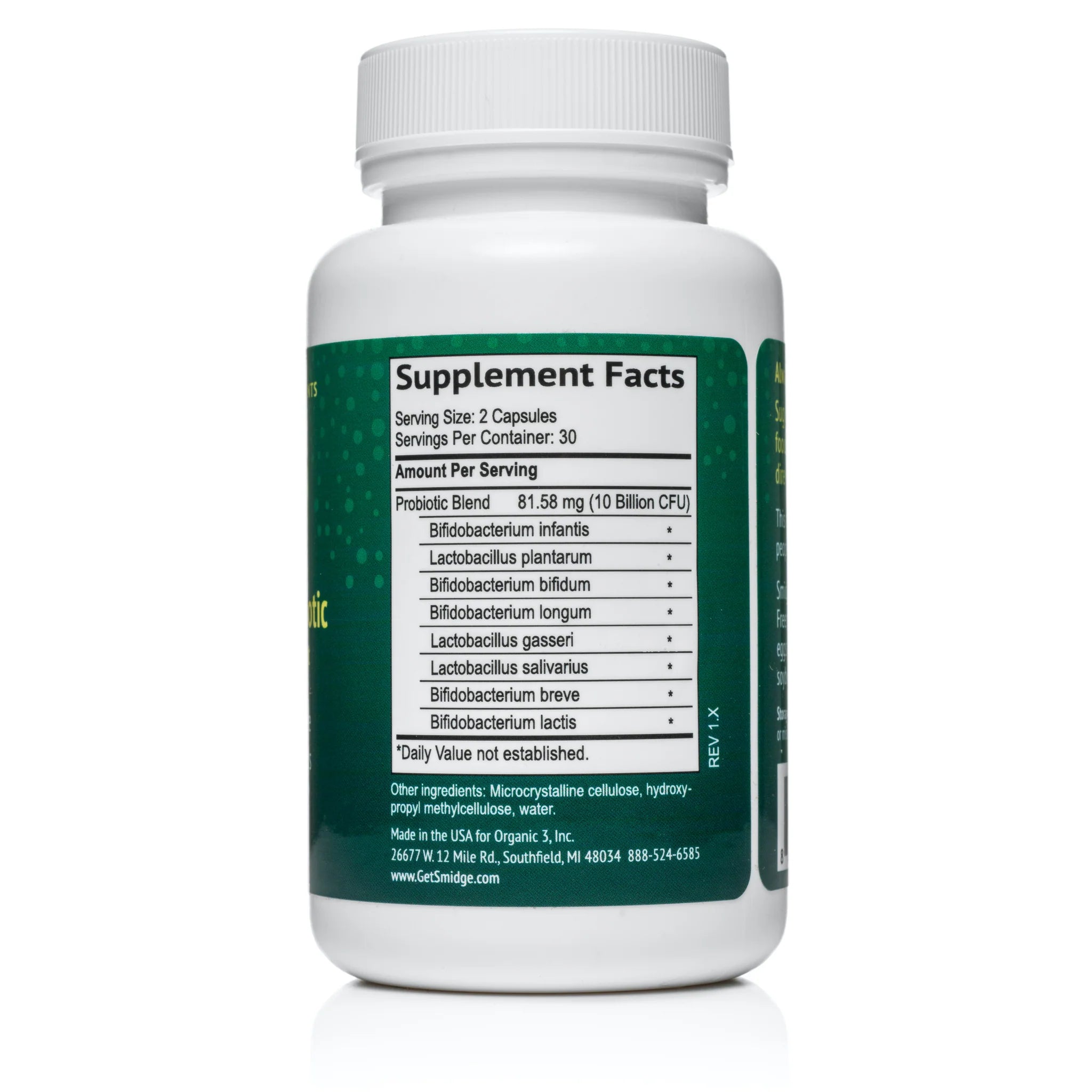


Smidge Sensitive Probiotic Capsules
Smidge® Sensitive Probiotic (formerly GutPro® capsules)
Smidge Sensitive Probiotic, now in a convenient oral capsule, brings the same trusted GutPro formula to those always on-the-go. This super clean, potent, and therapeutic-grade probiotic ensures optimal digestive health.
With eight essential strains of beneficial bacteria, it's specially formulated for folks with sensitive digestive systems. Notably absent are the strains found in commercial probiotics which can lead to histamine intolerance, d-lactic acidosis, and other potential reactions.
After decades of diligent research and valuable feedback from practitioners, scientists, professionals, and individuals deeply invested in gut health, we've crafted this blend. Its aim? To aid in the breakdown and assimilation of nutrients, restore proper digestion, and enhance elimination. All the benefits are encapsulated in these powerful, small-batch probiotic capsules.
Another standout feature is the omission of common allergens or unnecessary ingredients. Plus, there's no inclusion of prebiotics like inulin or maltodextrin.
The capsules, being less condensed than the powder, are an ideal choice for those just beginning their probiotic journey. And their compact form makes them perfect for travel!
Each pack contains 60 vegetarian capsules, offering a 1-month supply with a robust 5 billion CFUs per capsule.
Dosage Directions
Infants: Use Smidge® Infant Probiotics only.
Children (Ages 3 and up): Take 1/2 - 1 capsule daily with a meal (The capsule may be opened to give 1/2 at a time or smaller amounts in the beginning)
Adults: Start with 1 capsule and work up to 2 capsules daily with a meal.
This Probiotic is safe to take while Pregnant/Breastfeeding. Please be sure to reach out to your Certified Healthcare Professional about using supplements and their dosage while Pregnant or nursing.
How to take:
We recommend taking the probiotics in the morning, and most importantly with a meal. It is beneficial if the meal also contains some fat. Through our research, this is when we have found the best time for the probiotics to survive the stomach acid and reach the intestines where they belong. You may swallow the capsule(s) whole with water, or you may open the capsule and sprinkle the probiotic powder into a smoothie, or on top of yogurt, ghee, or applesauce.
Mixing the powder into liquids is not recommended.
Remember, A Smidge® is BIG! Our probiotics are very clean and pure, so remember to start low and slow when introducing them into your body.
Also be mindful of any changes in your body. Signs that you are taking too much of the probiotic show up as cold or flu-like symptoms: muscle aches, fatigue, brain fog, difficulty sleeping. They are called die-off symptoms. Other symptoms to look out for that can be especially prevalent in children are skin flareups or rashes (eczema, cradle cap, or acne), difficulty concentrating, and bowel movement changes.
Note:
If an allergic reaction occurs, it is not likely that it is because you are allergic to the probiotic, but rather because it is a little too potent for you. Please follow these steps:
- Take 1/2 dose every three days until your body becomes well adapted to it (we suggest two weeks).
- Take 1/2 dose every two days until your body becomes well adapted to it (we suggest two weeks)
- Take 1/2 dose daily until your body becomes well adapted to it (we suggest two weeks) then slowly increase it to a full dose.
Choose options



Ingredients
B. infantis is a folate-producing beneficial bacteria, primarily found in the gastrointestinal tracts of healthy infants (and human mouths). It seems to play a critical role in establishing a healthy intestinal lining and a robust and well-regulated immune system.* Research has also linked B. infantis to helping mitigate inflammation in the digestive system and throughout the body, stating that it may reduce the production of inflammatory cytokines.* Research suggests B. infantis regulates the production of tryptophan, which is the precursor for serotonin (the neurotransmitter associated with a sense of satisfaction and happiness).* A note on folate: it's one of the B vitamins responsible for tissue growth and cell function.*
L. plantarum is a plant-based, beneficial probiotic strain naturally found in fermented foods like sauerkraut. Several clinical trials have shown that L. plantarum helps support comfortable digestion, helping to minimize gas and bloating.* One of the most common probiotics, L. plantarum seems to support immune system health.* Not only does L. plantarum stimulate the production of anti-inflammatory cytokines like IL-10, it also seems to stimulate the production of regulatory T-cells.* And, preliminary studies indicate that L. plantarum may help strengthen memory, concentration and mood.*
Bifidobacteria are a group of bacteria that typically live in the human intestines and stomach, that help to perform essential functions like digestion and the maintenance of beneficial bacteria. One study suggests that B. bifidum may support immunity by staving off colds and touches of the flu in the winter months. Another clinical study indicates B. bifidum may help with abdominal discomfort caused by gas and bloating.* And yet another study states that B. bifidum can help with occasional diarrhea.* Clinical research suggests that B. bifidum can help maintain comfortable joint movement.* There's also a correlation to improved mental health (boosting mood and easing anxiety), as bifidobacterium is classified as a "psychobiotic", which affects central nervous system-related functions and behaviors mediated by the gut-brain-axis.
One of the first bacteria to colonize our bodies at birth, B. longum has been associated with helping to digest milk and other challenging foods, as it produces lactic acid from the fermentation of sugar in the gut.* Research suggests that B. longum may support immunity and growth in children.* It's also linked to helping maintain healthy cholesterol levels already within a normal range.* And it's been studied to help alleviate stress.
L. gasseri is naturally found in the human digestive and urinary tracts. It's been shown in clinical trials to help people lose weight.* Preliminary research indicates that L. gasseri may inhibit inflammation signaling at the genetic level.* L. gasseri may also support healthy cholesterol levels already within a normal range.*
L. salivarius is one of the most prevalent probiotic species in human saliva. It produces organic acids, such as lactic acid and acetic acid from carbohydrates. L. salivarius seems to help keep the microbial population in the mouth healthy.* Also, several clinical trials indicate that L. salivarius seems to help support the immune system and, as a result, support healthy skin.* Importantly, researchers state that it may keep the vagina healthy and comfortable by promoting a healthy pH balance.*
B. breve is one of the most helpful probiotic bacteria in the human body due to its unique ability to compete with harmful bacteria by digesting a large variety of molecules. It's also prevalent in the colons of breastfed babies. B. breve is linked to helping with occasional constipation in children.* And when combined with a gluten-free (real food) diet, B. breve promotes microbial balance in the digestive tracts of children.* B. breve seems to play a role in helping to establish a healthy microbiome, based on trials involving preterm babies. And, clinical research suggests it may be useful in recolonizing the guts of children who have undergone chemotherapy.*
A transient probiotic bacteria that inhabit the human intestines and the colon, B. lactis breaks down body waste and aids in the absorption of various vitamins and minerals.* One study showed that B. lactis helped preterm babies gain weight and helped develop their immune systems.* Beyond the babies, extensive research has shown that B. lactis is useful when it comes to abdominal comfort and proper digestion, helping to get the colon in shape and making occasional constipation a thing of the past.* Notably, preliminary lab research indicates B. lactis shows exciting potential in neutralizing certain issues associated with wheat.*
Microcrystalline cellulose is all natural refined wood pulp. We chose this ingredient to satisfy the needs of our most sensitive customers.
Hydroxypropyl methylcellulose (HPMC), water. Our vegetable (vegan) capsules consist of only two ingredients: HPMC and purified water. HPMC is derived from vegetable cellulose of pine. 100% natural, these capsules contain no preservatives, no gelatin, wheat, animal by-products or starch.
Need help?
Frequently Asked Questions
We've had customers who've tried a dozen – sometimes as many as 20 – different probiotic formulas. And after years of frustration and despair, they've told us that this formula is the one that finally worked for them. Here's why:
- No histamine-producing strains (Our Sensitive Probiotic contains only histamine-neutral or histamine-degrading strains of probiotic bacteria)
- No strains known to contribute to D-lactate acidosis
- No streptococcus thermophilus or other strains linked to adverse reactions
- No spore-forming strains of probiotics (e.g. soil bacteria)
- No inulin, maltodextrin or other prebiotics that can feed pathogens
- No excipients and other added ingredients, i.e., magnesium stearate, silica, titanium dioxide
- No common allergens: All strains are grown on a dairy-free, soy-free, vegetarian, non-GMO culture. Does not contain milk/casein, eggs, fish, shellfish, wheat/gluten, peanuts, tree nuts, yeast, corn or soy
Both Smidge® Sensitive Probiotic capsules and Sensitive Probiotic powder contain the same formula: the same strains in the same ratios.
The capsules contain cellulose, which is required to keep the powder in capsule form. The capsules have 5 billion CFUs per capsule, allowing for easy titration of doses.
The powder does not contain any additional ingredients at all.
The powder contains 6 trillion CFUs per bottle; the capsules contain 600 billion CFUs per bottle. In other words, one bottle of Smidge® Sensitive Probiotic Powder is the equivalent to 10 bottles of the capsules. Although the powder costs more upfront, it's more economical in the long run.
Our customers choose the capsules for convenience, whether they have a student in college, are traveling or just want to pop a little pill and run out the door.
For families all using the same probiotic, we recommend Smidge® Sensitive Probiotic Powder, as you can easily individualize the doses with the cute mini measuring spoon, and because there are more doses of the pure powder.
Yes! Smidge® Sensitive Probiotic capsules (and all of our probiotics!) can be shipped when it's hot outside. Because it requires refrigeration, we only ship orders Monday through Wednesday using two-day premium shipping services that include tracking. We also have an overnight shipping option.
Smidge® probiotics are freeze-dried, so they hold up well to warm temperatures.
Here's the fun part. We recommend taking your probiotic with a meal (around the same time daily). It's beneficial if the meal also contains some natural, organic fat or oil.
Taking your probiotic with real food provides a buffering system for the supplement and ensures its safe passage through the digestive tract. Food also provides the friendly bacteria in your probiotic the proper nourishment to ensure its survival in your gut.
Our probiotics work best with an ancestral diet: unprocessed foods (meat, vegetables, fruits), healthy fats (olive oil, butter, lard, coconut oil, etc.) and no grains (i.e., no wheat, corn, rice, soy, etc.).
Please avoid taking probiotics with certain foods that may diminish the potency:
- Avoid chlorinated water.
- Avoid hot soup and hot beverages (coffee, tea, etc.).
- Avoid highly processed foods (store-bought juice, sugar, wheat and soy products).
Our probiotics and supplements work best in conjunction with a wholesome, real food diet. Think healthy fats, wild-caught fish, grass-fed meat, organic fruits and vegetables, and the elimination of pesticides, GMOs, additives, preservatives, chemicals and processed sugar/flour. So eat clean and eat up!
At the average adult dose of 2 capsules per day, one bottle will last 30 days.
We wouldn't have it any other way :) Our Sensitive Probiotic capsules are free of common allergens. All strains are grown on a dairy-free, soy-free, vegetarian, non-GMO culture. It does not contain milk/casein, eggs, fish, shellfish, wheat/gluten, peanuts, tree nuts, yeast, corn or soy.
Smidge® Probiotics are comprised of freeze-dried bacteria. Old school probiotics contained live cultures that died in transit due to warm temperatures. Freeze-dried bacteria are able to withstand warmer temperatures during transit.
The strains in our Sensitive Probiotic capsules are sourced and produced right here in the U.S. :)
Smidge® Sensitive Probiotic capsules have eight clinically-proven strains of probiotics for gut health (seven human strains: L. gasseri, L. salivarius, B. bifidum, B. breve, B. infantis, B. longum, B. lactis; and L. plantarum, a plant-based strain).*
Before starting any new supplement, it’s best to first run it by your doctor. But, each of the eight strains in our Sensitive Probiotic powder has extensive research supporting their safety and efficacy in helping to revitalize the body.* We also considered the growth rate of these strains, so they would help maintain the balance in your gut.* For instance, its histamine-degrading strains balance the histamine-forming strains in the proper ratio.* This way, you can maximize your probiotic benefits while still minimizing your exposure to D-lactate and histamine.* (See more on D-lactic acidosis in the question below.)
D-lactic acidosis occurs when the body produces an excess of a poorly-metabolized form of lactic acid (as compared to the more common and more readily metabolized L-lactic acid). Folks often experience brain fog— cloudy thinking, difficulty concentrating, fatigue and forgetfulness. These mental symptoms can be accompanied by digestive issues such as bloating, abdominal discomfort and distension, and gas after meals.*
Here is the Smidge® philosophy in relation to avoiding side effects from D-lactic acidosis. Eating processed foods and sugar can contribute to gut dysbiosis, both of which are contributing factors to D-lactic acidosis. Taking a probiotic that contains acidophilus as its primary strain, which generates D-lactic acid, can worsen things.
Many eventually realize this and take a probiotic that avoids D-lactate strains — a great first step! But to really tackle the issue of D-lactic acidosis, many have found relief from eating a diet full of fresh, real, unprocessed foods, and taking a probiotic containing plantarum. Studies show that despite containing D-lactic acid and L-lactic acid, plantarum can reduce lactic acid and may even reduce lactic acidosis.*
Here’s how: L. plantarum initially produces L(+)-lactate, and then switches to making D(-)-lactate, allowing for equilibrium. The production of D(-)-lactate in L. plantarum is linked to the cell wall's biosynthesis.
So, Smidge® Sensitive Probiotic contains seven strains that only produce L-lactic acid — and L-plantarum has been shown to reduce D-lactic acidosis.* In all, plantarum is a powerful probiotic strain that, when combined with a healthy diet, can restore or address gut dysbiosis.*
No. Most commercial probiotics are up to 80% prebiotics. This is notable because adding prebiotics reduces the potency of a probiotic supplement and therefore, reduces the cost per bottle. More importantly, we intentionally keep prebiotics separate from our probiotic formulas. We do not (add any additional ingredients), as many of our customers have very sensitive digestive systems or are biohackers who only want purity.
A probiotic can work alone and does not require a prebiotic. Our pure probiotics can colonize without a prebiotic. Additionally, not all people taking a probiotic need a prebiotic. We recommend starting our probiotics without a prebiotic, before determining whether or not to add it to your protocol. We believe it's essential to focus on diet and real food to support the colonization of good gut bacteria.
Here's some additional background regarding our philosophy on prebiotics:
Most commercially available prebiotics are made from FOS/inulin. This starchy, sugary substance is counterproductive to gut health and overall health. There's also a concern that some kinds of yeast can use inulin/FOS for fuel, thereby leading to overactive yeast production in the body.
Probiotic bacteria have the intelligence to aid with diarrhea and constipation, by modulating and regulating water in the colon to provide regularity.* So when you take quality probiotics regularly in combination with a whole food diet, your digestion and regularity are well, regular!*
Oxalate sensitivity is triggered by certain greens, veggies and fruits that people with sensitive digestive systems cannot handle, and it’s similar a histamine reaction. The L. plantarum in Sensitive Probiotic works to remove oxalates that can build up in the system and cause inflammation or dysbiosis.*



